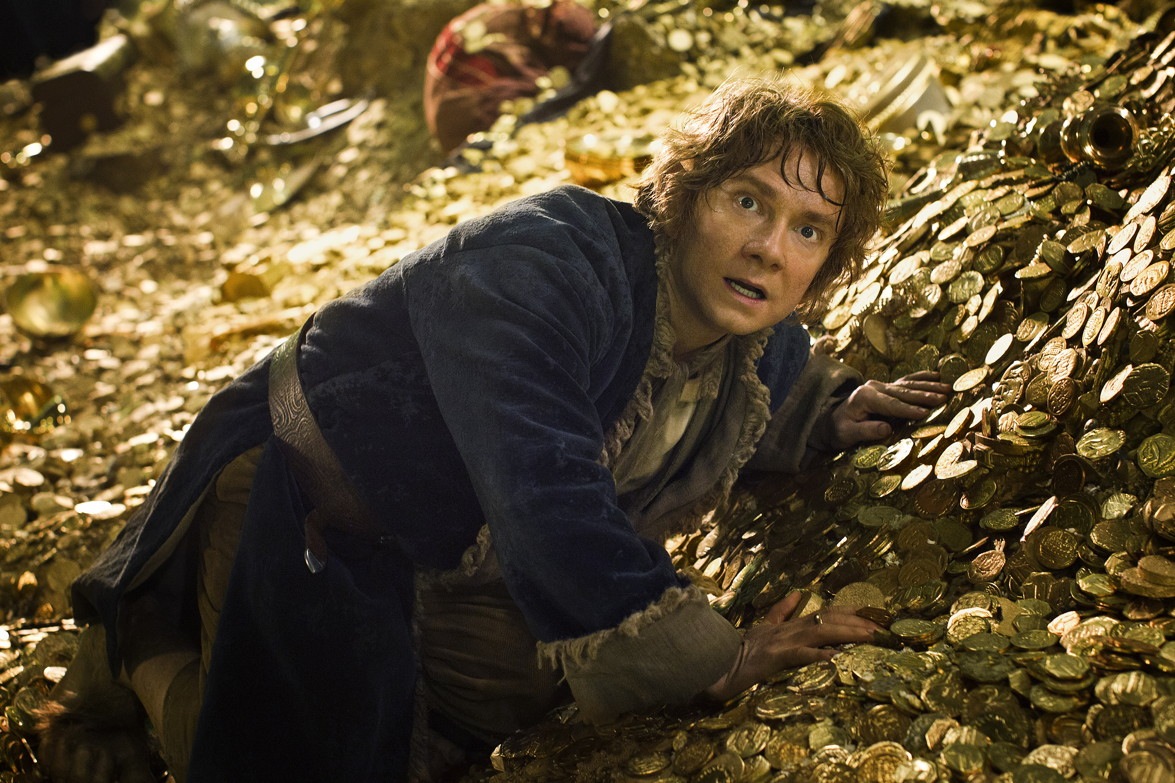25 Points: Crystal Eaters
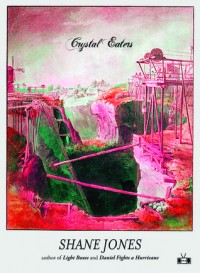 |
Crystal Eaters
by Shane Jones
Two Dollar Radio, 2014
172 pages / $16.00 buy from Two Dollar Radio or Amazon
|
0. (is) The number of fucks Shane Jones gave when he wrote Crystal Eaters.
1. Like let’s be honest. Crystal Eaters really, is Shane Jones’ giant middle finger to the publishing industry and I love it. (Like, New York City, aka: where the big book-type stuff happens). (*cough* *cough* Penguin Books *cough*).
2. I like that Crystal Eaters was released via a small indie press like Two Dollar Radio and not Penguin Books. Really. And I don’t know why.
3. That’s a lie.
4. Actually, I do know why.
5. When Shane Jones wrote that article about his shitty experience with (publishing and editing) Daniel Fights a Hurricane, I kept thinking to myself: so, for his next book, is he going to try and come up with something super-boring and ultra-generic/fake for the suits so they will sign him for another deal or is he just going to keep doing his own thing and not sell out?
6. Crystal Eaters pretty much answered my question.
7. Really, for me, the experience of reading Crystal Eaters felt a little like watching Alejandro Jodorowsky’s Holy Mountain, in the sense that it is a contemporary fable “of what social engineering caused by greed has done to the modern world, but shows us how to live and not give in to a material world.”
8. (Isn’t it weird how the IMDb synopsis for Holy Mountain just blends beautifully with/and works as a sort of faux-narrative for Crystal Eaters?)
9. The cover, I love. It’s this highly colour-fucked version of Elias Martin’s pen drawing of the Dannemora mine circa 1780-1800. (Or, at least, what I think looks like a highly colour-fucked version of Elias Martin’s pen drawing of the Dannemora mine circa 1780-1800).
10. And it’s neat to think that the art for Crystal Eaters isn’t anything custom-made (like the covers for Light Boxes and Daniel Fights a Hurricane) but something that comes from something that already existed in this world prior to Shane Jones ever even coming up with Crystal Eaters.
September 16th, 2014 / 2:30 pm
Crystal Eaters
 |
Crystal Eaters
by Shane Jones
Two Dollar Radio, 2014
172 pages / $16.00 buy from Two Dollar Radio or Amazon
Rating: 10.0
|
So my dad’s an alcoholic. (That’s really hard to admit. In fact, this is the first time I’ve typed it out, as I’m drafting.) He’s not a monster. He never beat me or did any physical harm to me. Just had outbursts and left me with daddy issues.
So the reason why I’m sharing this is because Shane Jones’s Crystal Eaters helped me come to terms with some of my childhood. If you haven’t heard the premise of the novel here’s the rub: people in this village have a crystal count. Crystals are depleted when people get hurt, age, etc. When you reach zero you’re dead. There’s a rumor that eating rare, black crystals will increase your life count, but it’s just a rumor. Black crystals do work like psychedelic drugs though. Basically, The Crystal Eaters is a novel of addiction. Everyone is addicted to something, whether it’s their self-image as a good parent, the idea of extending their life, or they’re addicted to imbibing the psychotropic black crystals, themselves.
So the son, Pants, of the main family in the novel feels guilty because his mom is dying and he can’t really do much about it because he’s in jail for tripping balls on black crystal in public. In prison, Pants realizes that he’s an addict because his parents beat him instead of not taking the time out to understand him. That means a fuckton to me because I’m an addict, too—only to porn and alcohol. What I’ve come to realize, and what Jones reinforces in his novel, is that my dad’s fucked-upness is not my fault. It’s just how his parents equipped him. “Her father had done the same to her, and so did Dad’s, and it worked, look at them, adjusted people. She didn’t necessarily believe what she thought, but her family history was stronger than her head.” As a result, the same becomes true for Pants. And even though he feels super guilty and blames himself for his mother and dad and little sister’s misfortunes, it’s not actually his fault.
“The universe is a system where children watch their parents die,” which I take to mean, the world just spins, the city grows, the sun gets hotter. Of course there’s the chance that we’ll become addicted, too: it’s a way for our bodies to heal—a coping mechanism. We just need to examine the source of our desires. Why do I need to write? Why do I need to live forever? Why do I need to drink until my brain shuts off? If we can get a grasp as to what our motivations are, maybe we can have an easier time through life. The best we can do is not to fixate on the counting down to zero—because we will all reach zero—and, if we’re lucky, touch a heart or two on the way. Read the novel. Maybe it will help you come to an important realization, too.
August 19th, 2014 / 12:00 pm
Crystal Eaters by Shane Jones
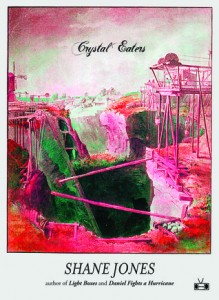 Crystal Eaters
Crystal Eaters
by Shane Jones
Two Dollar Radio, June 2014
202 pages / $16 Buy from Amazon or Two Dollar Radio
The first, most obvious observation to make about Shane Jones’ Crystal Eaters is that it begins with a countdown. Its first page is numbered 183, and it descends from there, 182, 181, 180, on and on, a timer that makes this novel feel like an unusually rigid experience, temporally speaking. After all, most books are objects that readers pick up and interact with on their own terms, at their own individual paces. Crystal Eaters’ countdown, however, makes the book feel fleeting. While in the midst of reading it, I imagined it still counting down even when sitting on my coffee table, closed—like I would eventually open it again only to find all its pages blank, its time expired.
Crystal Eaters focuses on a village that “survives on myth,” and Jones’ paginated countdown helps immerse the reader in the village’s central belief: that human beings are filled with crystals—100 at the time of birth—which crystals are then lost over the course of a life (bled out, vomited up, etc. etc.), until a person’s number reaches zero, and that person dies. The crystals are multi-colored, and Jones writes of village kids witnessing “their parents vomiting blue and yellow slush into kitchen sinks, toilets, couch cushions, their laps.” Illness in this book is surprising in its glowing, cotton-candy brightness. Almost psychedelic.
Jones’ cornerstone character—named Mom—is an example of psychedelic sickness. Shriveled by illness, Mom spews red everywhere at dinnertime. She’s down to her last few crystals, and she will die soon, a reality with which her family struggles. Her husband—named Dad—is aloof, trying to make the impending tragedy easy for everyone, but ultimately helpless against his wife’s disease. Their daughter—named Remy—believes that there must be a way to increase a person’s crystal count, thus staving off death. “The universe is a system where children watch their parents die,” perhaps, but not Remy: “She’ll save Mom from experiencing the number zero.”
A fourth character, however, expands the novel’s scope beyond the village. This character—Mom and Dad’s son, and Remy’s brother—is imprisoned, and his name is Pants McDonovan. (This may be the key question of my entire review: Do you or do you not want to own a novel that features a character named “Pants McDonovan”?) Pants used to be a revolutionary, waging a war against the unnamed metropolis that inches closer to the village each day (modernity threatening to engulf the village’s way of life). Now, Pants lingers in his cell, eating pieces of his secret stash of “black crystals.” No villager apart from Pants has ever seen a black crystal before; they exist as part of the larger system of myth that Jones suggests through his use of in-text citations, e.g., “His left eye drips crystal (Chapter 5, Death Movement, Book 8),” and, “the city has powers (Chapter 14, Resurrection, City Hospital Myth).” Remy thinks these black crystals might hold the secret to increasing Mom’s crystal count, but Pants, locked away from his family and unaware of the severity of Mom’s illness, uses the crystals in a different way: he ingests them to prompt hallucinations that help him escape the indignities of prison life.
April 14th, 2014 / 10:00 am
14 eaters of itter leeps (stove smoke)
1. Holy fuck the WET cover gallery is the crystal bomb.
5. Are women writers really inferior? (This link blown-out so forget it. I’ll get the Francine Prose essay in later)
3. Percival Everett wins The Believer book award.
2. Fearlessly and courageously is the best way to break-up with anyone, eat boiled crayfish, write the first draft of a poem.
14. Wicked Aaron Burch/Lucy Corin discussion over EWN.
7. Best way to network is beer. If you don’t do beer, do softball. If you don’t do softball, survive something intense and dangerous together. If you can’t survive I and DT, try not to be an asshole, daily.
9. Bears.
An Anonymous Email to Shane Jones
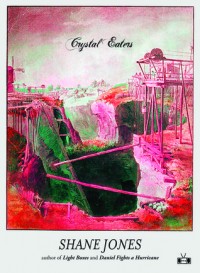 |
Crystal Eaters
by Shane Jones
Two Dollar Radio, 2014
172 pages / $16.00 buy from Amazon
|
Shane Jones,
To this day, I have still never seen these movies: Ray and Walk the Line. There are probably a few reasons why I haven’t, but one of the most important reasons concerns the fact that these movies were extremely hyped upon their release. Everyone was blowing their load. And by everyone, I guess I mean critics and my parents. So, I never saw them. I have a tendency to shy away from things that have received too much positive hype. I know myself and I can usually expect that I will be let down.
Crystal Eaters. I awaited the release of your book for months. And when it came out, I ordered it. And when it arrived at my house, I didn’t read it, at least not for a while. I wanted to pick it up and start it, but I kept seeing all of these intensely wordy and existential reviews popping up on Twitter (I’m reasonably new to Twitter). I usually don’t know what to make of intensely wordy and existential reviews, people who say that reading Crystal Eaters is like setting your brain adrift in the primordial muck of your ancestral wandering and watching it develop a higher consciousness as you stand stuck on the shore of your own punitive physicality. What?
I read it recently. I had high expectations. I’d never had a reading experience that was like tripping balls. I still haven’t. I don’t know that I want to trip balls when reading something. So, Crystal Eaters. It had one of the coolest concepts I had ever heard of, so naturally, while awaiting its release, I started to imagine what the book might be like. Months of imagining. It was like being in high school and idealizing the girl who has the locker across from you and finally having the chance to speak to her when you both find yourselves the last ones out the door from spanish club. And boom! You walk up with the perfect opening line only to hear her squeak one out because she doesn’t notice you coming and she’s never noticed you. All of this is to say that reading Crystal Eaters was nothing like a fart. It was a book that kept me up late. It frustrated me. I talked to my fiancé about it endlessly and now she is reading it because she wants to have a better idea of what I am talking about so we can discuss it further.
July 24th, 2014 / 1:07 pm
The Doorknob Passage – A Conversation with Bennett Sims
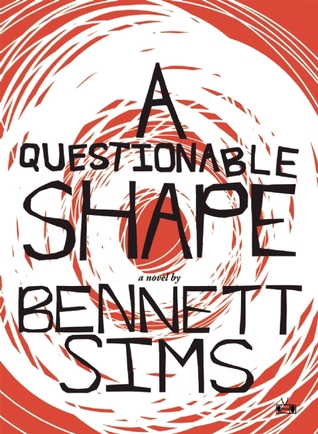
I’ve never read a zombie novel, and after reading A Questionable Shape, the debut novel from Bennett Sims, which has been described as a zombie novel, I still haven’t. We see glimpses of rabid zombies on grainy mall security cameras, ghost-like versions in a field, and zombies crowding a police car, but the book is more about retracing our memories, how to deal with loss, and ultimately, how to live in a world falling apart around us. It’s a philosophical mind-fuck of a novel filled with illuminating sentences and dark footnotes.
Bennett and I traded emails to discuss his time as a student of David Foster Wallace, paranoia, insecurities, influences, and push-ups.
Shane: So, how are you feeling?
Bennett: It’s the end of the semester, so I’m feeling somewhat hollowed out. This year I was teaching an undergrad fiction workshop here at the University of Iowa, and I wrapped up all my grading yesterday. Nabokov has that line about finishing a work, how he feels like ‘a house just emptied of its grand piano.’ It’s a little like that—except that instead of producing beautiful music, the part of me that’s missing is used to shooting off workshop letters and miscellaneous correspondence. So I guess I’m feeling like a house just emptied of its fax machine, which is a different kind of quietness. How are you feeling?
Shane: I’m depressed because I’ve been doing nothing but eating cookies and drinking coffee and now I’m crashing from it. I’ve never heard of that Nabokov line before but I like it. Pale Fire is a beast and my favorite of his. Did Nabokov influence A Questionable Shape? I see some of his wordplay and magic in your sentences.
Bennett: Sorry to hear about the cookie-and-coffee comedown. I usually have to take a nap when that happens.
Thanks for the kind words about the book. I’m flattered by the Nabokov comparison. He’s definitely a background influence—one of the stylists I’ve admired longest, whose sense of wordplay and whose sheer felicity of description I’ve tried to absorb. But I was not thinking about any particular work of his when drafting A Questionable Shape. The footnotes, for instance, were self-consciously modeled on Nicholson Baker’s The Mezzanine, rather than Pale Fire.
Soderbergh on Cinema is Soderbergh on Publishing
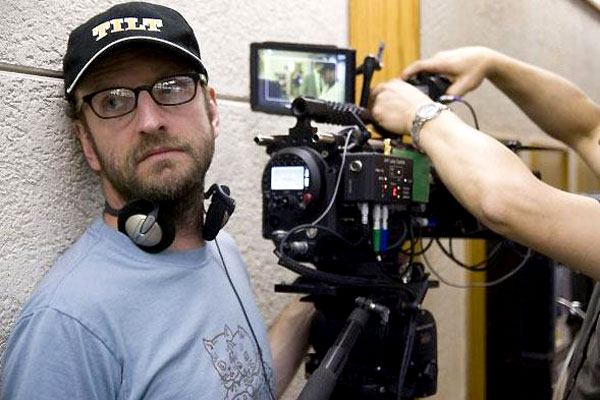
Film director Steven Soderbergh recently spoke at the 56th annual San Francisco International Film Festival. Before the speech Soderbergh said he would “drop some grenades.” Rarely does that happen. But what Soderbergh did was special – he pierced holes into an industry that is corporatizing and mainstreaming a once beautiful and individualistic art form.
I’m not a student of film nor would I consider myself knowledgeable on the industry. So after I read the full transcript of Soderbergh’s speech I wondered why I was so captivated. The answer was simple: I was reading a speech about the state of film, but as a writer, I was reading a speech about the state of publishing.
Soderbergh’s main sticking points: a bigger film budget yields bigger results, those in charge at the studios don’t watch cinema, artists need to be supported financially long term, ambiguity is toxic to a mainstream audience, and too much emphasis is placed on testing and pre-sales numbers, may sound like sour grapes to some, but I believe he’s accurate. I believe what he says about the state of cinema is in direct correlation to how I, and many, feel about the state of publishing.
Soderbergh loves strangeness and ambiguity in film. The ambiguity in my second novel, published by Penguin, was questioned by my editor. The push to extend the “reality storyline” in the book became a main focus during revisions. There had to be more of a love story. Things had to make sense. Sentences deemed strange and vague were questioned with “I really like this, but what does it mean?” The push for things to “make sense” has resulted in boring movies and boring books. READ MORE >
250 Points: The Hobbit pt 2: The Desolation of the Hobbit
- I missed The Hobbit: The Desolation of Smaug in theaters. Obviously since I wrote so much about the last one, I considered seeing its follow-up on more than one occasion, but just couldn’t summon the energy, even though a good friend invited me to join her, promising she’d bring snacks from Trader Joe’s.
- And then a few days after that, while I was out strolling the boulevard, I passed another friend who was en route to see the thing, on a lazy, chilly Sunday afternoon. But instead of joining him, I went home and took a bath.
- So you can see how excited I was to watch this movie. Please keep that in mind as you read this.
- Then the film left theaters, and I realized I’d missed my one and only chance for all time. I rushed to my local multiplex and pleaded with its employees to give me a private screening, but they refused, and threatened to call the police. Again.
- I despaired, and spent a week wondering what had happened to Bilbo, and Gandalf, and Thorin, and Whorin, and Hewy, and Dewy, and Chewy, and Killy, and Thrilly, and Culty, and the ninety-seven other little dwarves, and everyone else in Middle-earth.
- Suddenly, just when I could no longer bear the suspense, a CGI moth flew through my window, gripping an AVI copy of the film in its fuzzy mandible. It landed on my shoulder and mumbled something about how Gandalf was in trouble and “needed me.”
- Well, I need you, too, Gandalf! So I decided to watch the movie, after all, and take a lot of notes.
- These are my notes.
- It’s been fifteen long months since I watched An Unexpected Journey, and I barely remember anything that happened in it.
- It occupied a tremendous number of minutes? And presented a great many wolves and goblins that were born in a super-computer’s digital bowels?
- I do recall that the movie featured at least one terrific scene: the riddle game between Bilbo and the creature known as Gollum.
- Gollum won’t be in this new film, I have heard, which is a minus going in.
- Even still, I have no doubt that this movie will do its best to amuse and delight us, because that is how capitalism works. So let’s get right to it! READ MORE >


